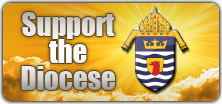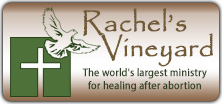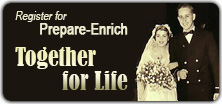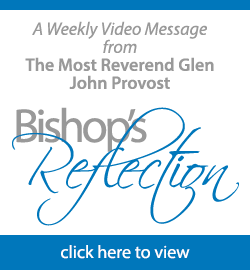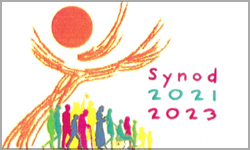LAKE CHARLES — Bishop Glen. John Provost was the celebrant for the annual Red Mass on Friday, September 10, in the Cathedral of the Immaculate Conception. He was joined by the Very Rev. Edward Richard, M.S., V.F., who served as homilist, and Rev. Samuel Bond, who assisted as Master of Ceremonies.
The Red Mass is celebrated at the opening of the judicial year and requests guidance from the Holy Spirit for all who seek justice. It offers those in the legal profession the opportunity to reflect on their God-given power and responsibility of justice. The liturgy focuses on wisdom, understanding, counsel and fortitude for those in attendance.
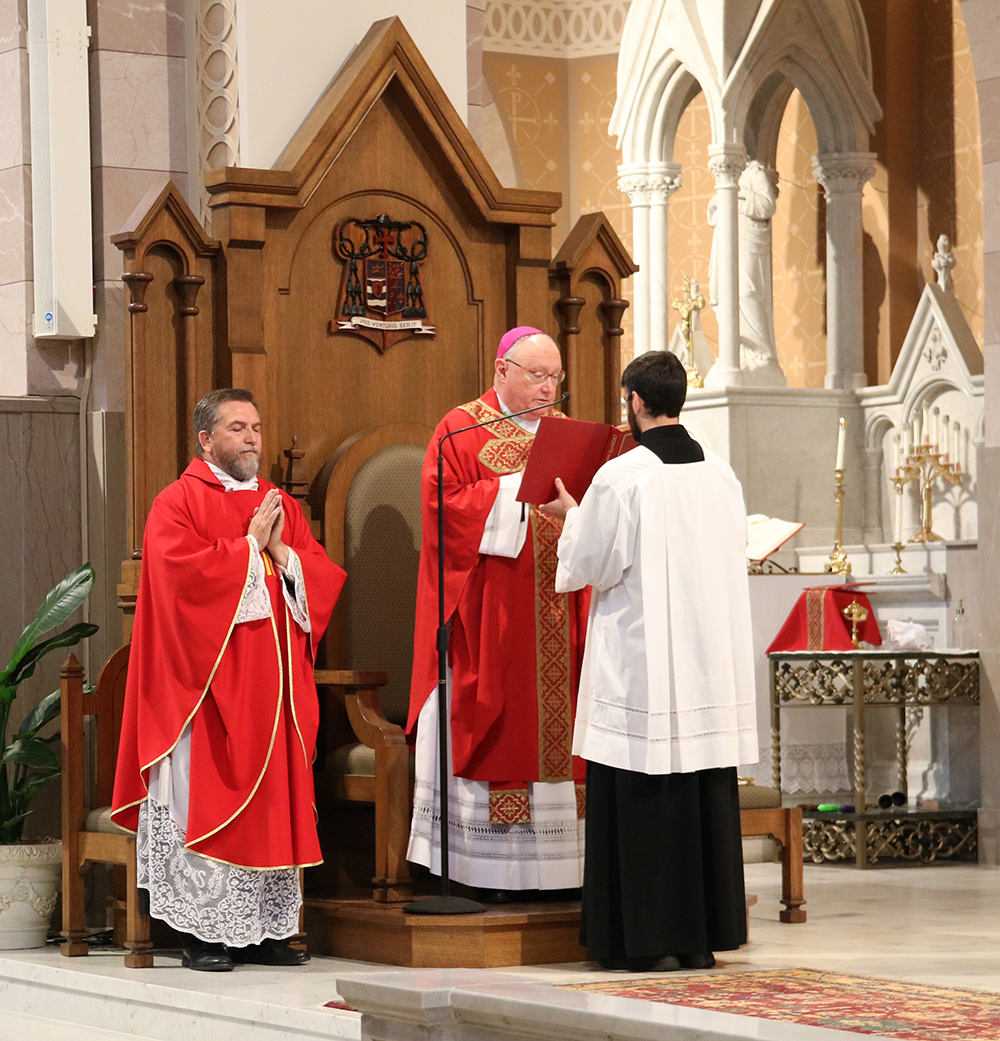
The Most Reverend Glen John Provost, Bishop
of Lake Charles; and Father Samuel Bond,
Master of Ceremonies
The Mass is so named because of the color of the vestments worn by the bishop and priests, donned in symbolism of the tongues of fire that descended on the Apostles. The celebration of the Red Mass goes back many centuries with the first recorded Mass in the Cathedral of Paris in 1245. In Louisiana, the first Red Mass was offered in St. Louis Cathedral in New Orleans on October 5, 1953.
Locally, the annual Mass is open to judges, attorneys, and government officials from the five civil parishes of the Diocese — Allen, Beauregard, Calcasieu, Cameron and Jefferson Davis. It is sponsored by the Diocese of Lake Charles and the Saint Thomas More Society, Judge Henry Yelverton Chapter.
The text for Father Richard’s homily follows:
Your Excellency Bishop Provost, Your Honors, Members of the St. Thomas More Society and Members of the Bar, Brothers and Sisters in Christ,
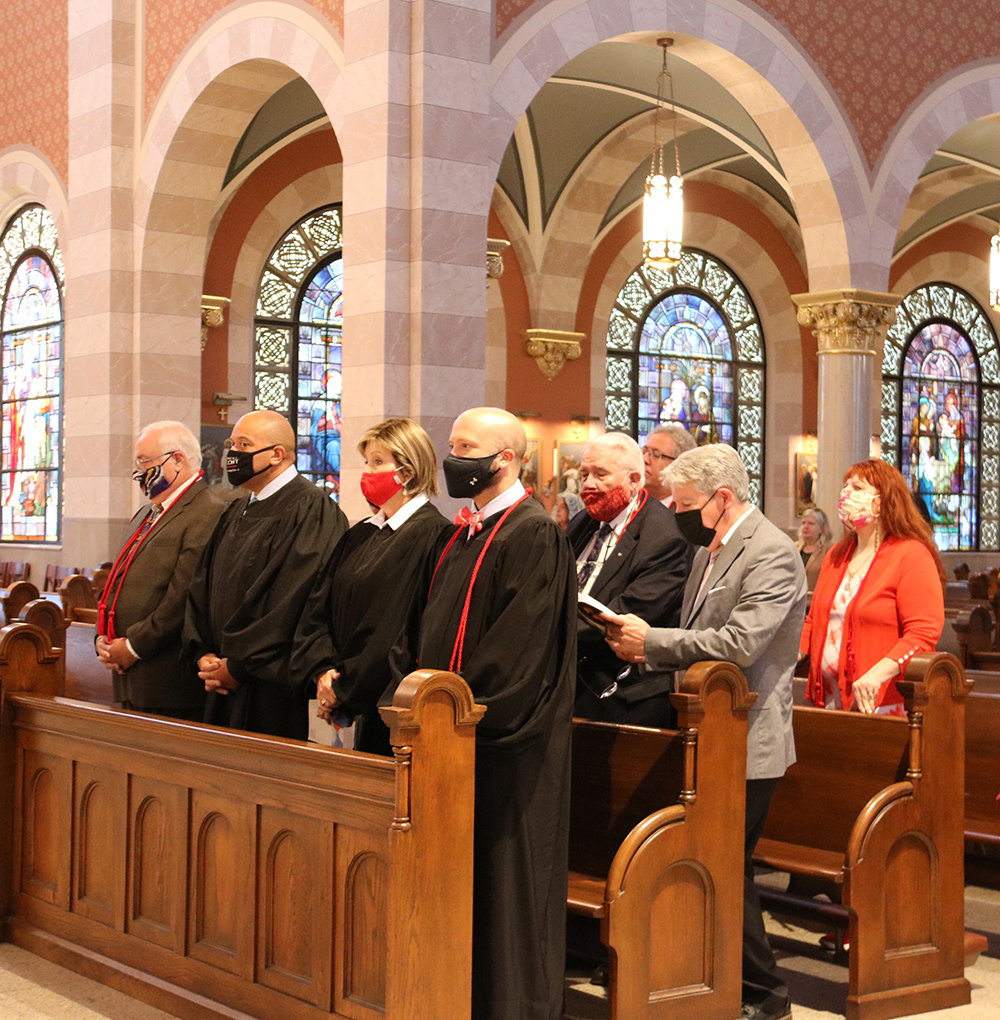
Red Mass on Friday, Sept. 10, celebrated annually in the
Cathedral of the Immaculate Conception in Lake Charles.
I would like to begin by thanking Professor J. Randall Trahan of the LSU Law Center for his presentation last evening. Professor Trahan holds the Saul Litvinoff Distinguished Professor of Law Chair, among other positions of distinction, at the school. The analysis of US Supreme Court jurisprudence on the First Amendment rights pertaining to religious practice and speech was engaging and timely.
Historians Schweikart and Allen (A Patriot’s History of the United States, Sentinel, 2004) tell us that Abraham Lincoln is said to have seen God’s hand in numerous events during the war, and in 1862 he wrote, “The will of God prevails. In great contests, each party claims to act in accordance with the will of God. Both may be, and one must be wrong. God can not be for, or against, the same thing at the same time.” (287)
These were the kind of thoughts that formed Lincoln’s rebuke of slavery, as it evolved over the course of his debates with Stephen Douglas in the contest for the Illinois Senate.
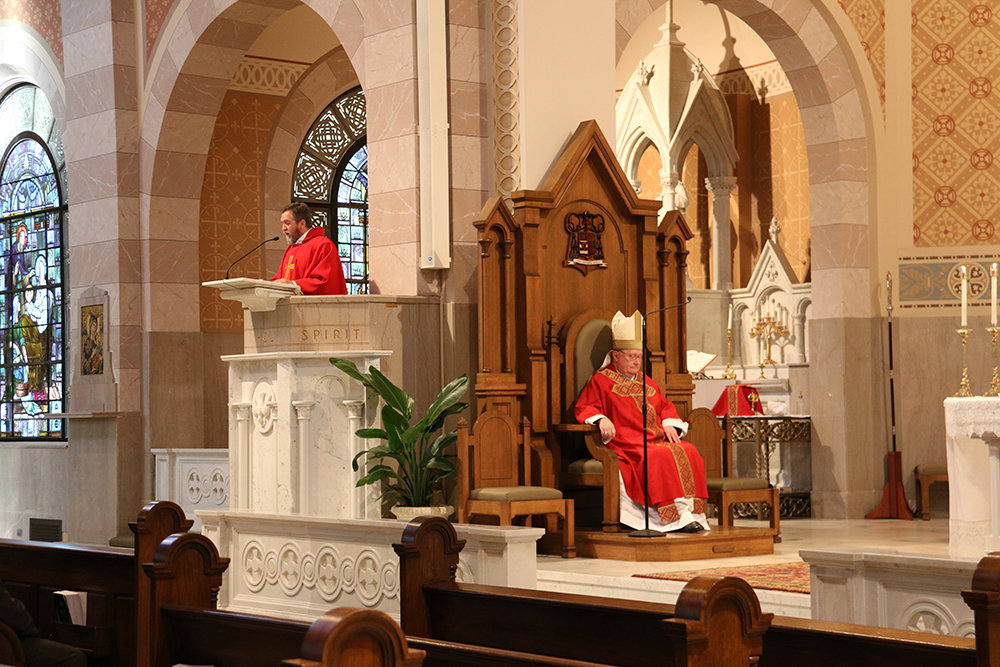
Catholic Church in Sulphur, presented the homily during the annual
Red Mass in the Cathedral of the Immaculate Conception on Sept. 10.
In 1857 Douglas espoused popular sovereignty in the slavery debate. He thus raised the central fact that slavery was not a cultural or economic institution but a relationship based upon power. It was oppression by political power.
By this point, however, Lincoln had maneuvered Douglas into defending the position that it did not matter if slavery was right or wrong, or even if the US Constitution according to the Court was right or wrong. It was a matter of the will of the majority. Lincoln, on the other hand, had placed the argument on a different philosophical plane, that of the morality of slavery. He identified it a moral, social and political wrong. He went further declaring that the “black man” was “entitled to all the natural rights enumerated in the Declaration of Independence, the right to life, liberty, and the pursuit of happiness…In the right to eat bread, without leave of anybody else, which his own hand earns, he is my equal and the equal of Judge Douglas, and the equal of every living man.” (Schweikart and Allen, 286-289.)
Do we act as though we truly believe God’s hand is at work today? Our faith in Christ illuminates our minds and directs our actions if we are to be just and righteous. The tenets of that faith that hold that the human person is made in the image and likeness of God and that he has been redeemed by the sacrifice of God’s own Son, are the foundation of the Christian ideal of justice.
St. Paul, a pharisee, understood justice from the perspective of righteousness based upon the restraint of the law before his conversion. After his conversion, he came to know life in Christ through the new, Evangelical Law of Christ. It is a formulation of the law so extraordinary that the Fathers of the Church saw in the Sermon on the Mount, the Charter for Christian living, not only because of it being Christ’s own words, but because of its predominant element, the Holy Spirit through which this New Law works in each of us. In every respect, the New Law of the Gospel completes and fulfills the Old Law, however, it in no sense abolishes it. Following St. John Paul II and St. Ambrose we recognize that the Law of Christ brings out the fullest meaning of the Decalogue and interiorizes its demands. “You have heard it said, ‘Love you friends and hate your enemies,’ But I say to you, ‘Love your enemies: do good to them that hate you: and pray for them that persecute and calumniate you.’” (Duoay-Rheims Bible, Matt. 5:44.)
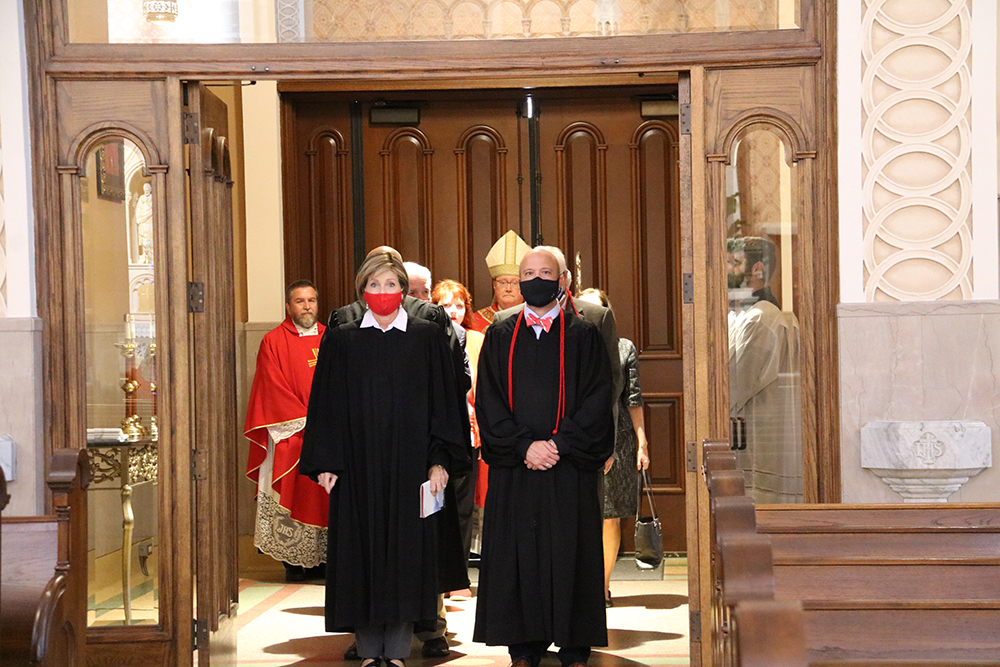
of the Red Mass in the Cathedral of the Immaculate Conception.
The Mass is sponsored by the Diocese of Lake Charles and the
Saint Thomas More Society, Judge Henry Yelverton Chapter.
Indeed, if love of God and love of neighbor is the summation of the law, then the love of one’s own soul, after the commandment to love God, must be first in the order of charity. For while Christ tells us to love our enemies, he does so with the caveat (in today’s Gospel reading from Luke, Ch. 6) that we must remove the plank from our own eye first; clearly a reference to a pure soul. This movement in wisdom leads ultimately to the realization of Christ’s example and teaching that the greatest love is found in laying down one’s life for one’s friends. “When fully trained, every disciple will be like his teacher.” (NAB, Luke 6:40)
Recognizing the great responsibilities imposed by our judicial system and the many day-to-day, practical realities faced by all of us in administering justice, of taking care of oneself and one’s family, and of serving the common good, it is imperative that we disciples not allow the Incarnation and Resurrection of Christ to escape from our vision. Our souls will flourish and be strengthened in the light of Truth.
Having distanced the law of the land from God, however, we live with the processes of this thing we human beings created. It was not always that way in our system of law but it is the way we see it now. Nonetheless, we are not slaves to such a system unless we choose to be. If by some fate we find ourselves in that position, it is because we who had the power over it have made it so. I suggest that there is no remedy for this, not a secular one, anyway. Secular humanity is always going about ejecting from our collective consciousness anything that is not consistent with its own immanent view of the world’s destiny. There is no secular formula that will make the world less fallen. There is no humanistic juridical decree that will make the course of justice the perfectly engineered reality that, in all our brilliance, we would like to be. There is only you, O Christian, and there is your God. And God has set you free in Christ. And if the son of Man makes you free, you are free, indeed. (See, John 8:36)




